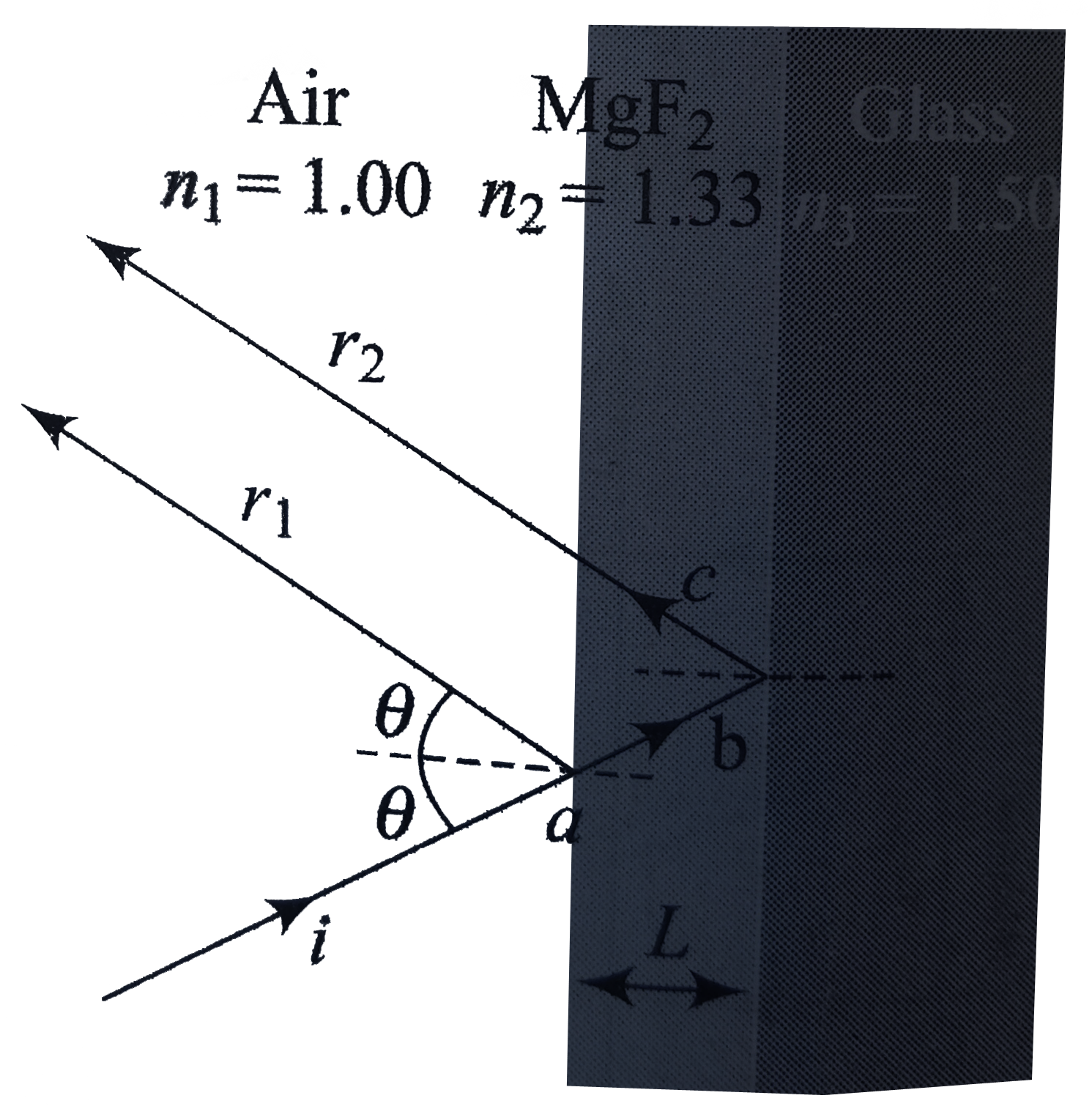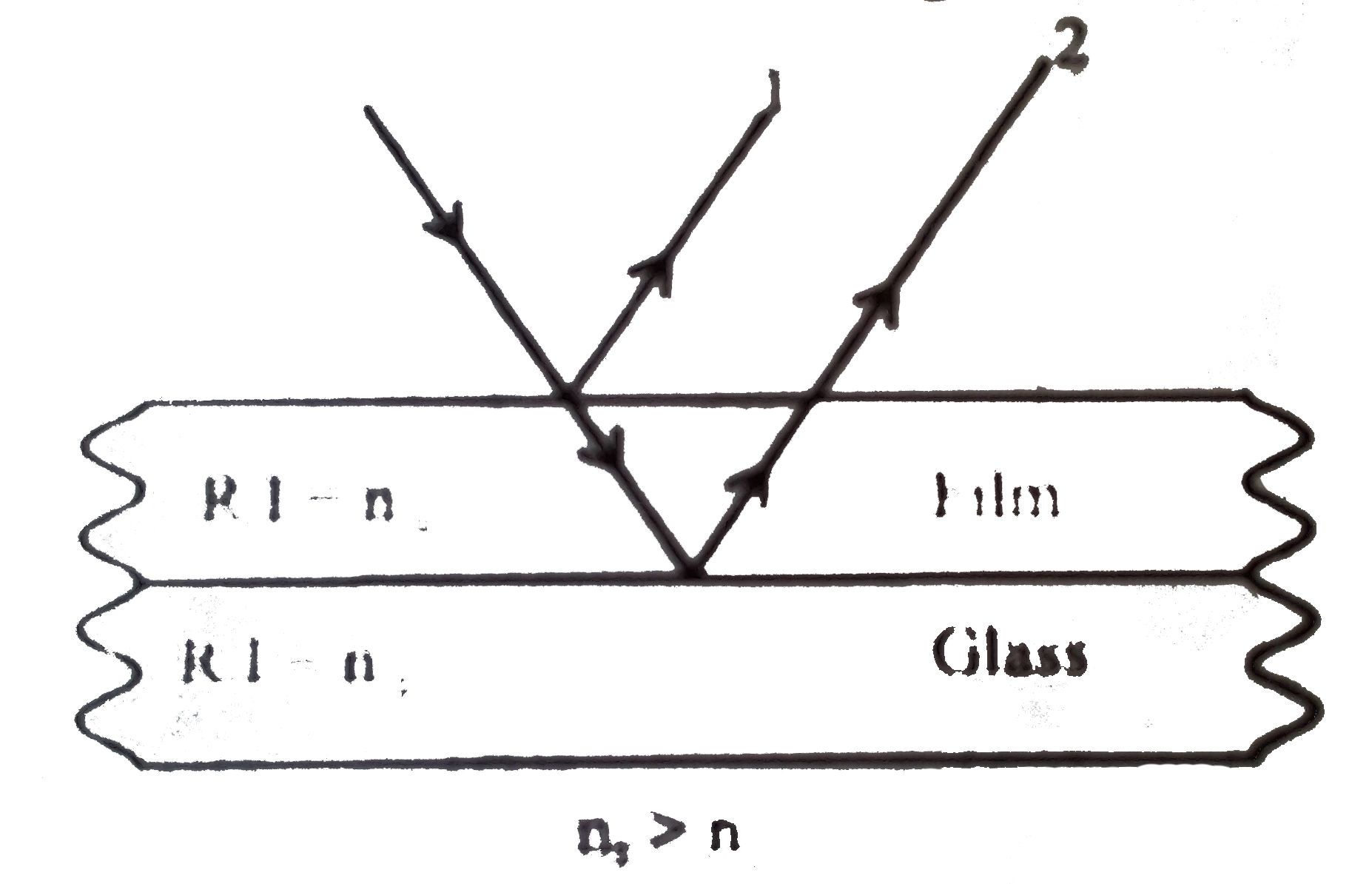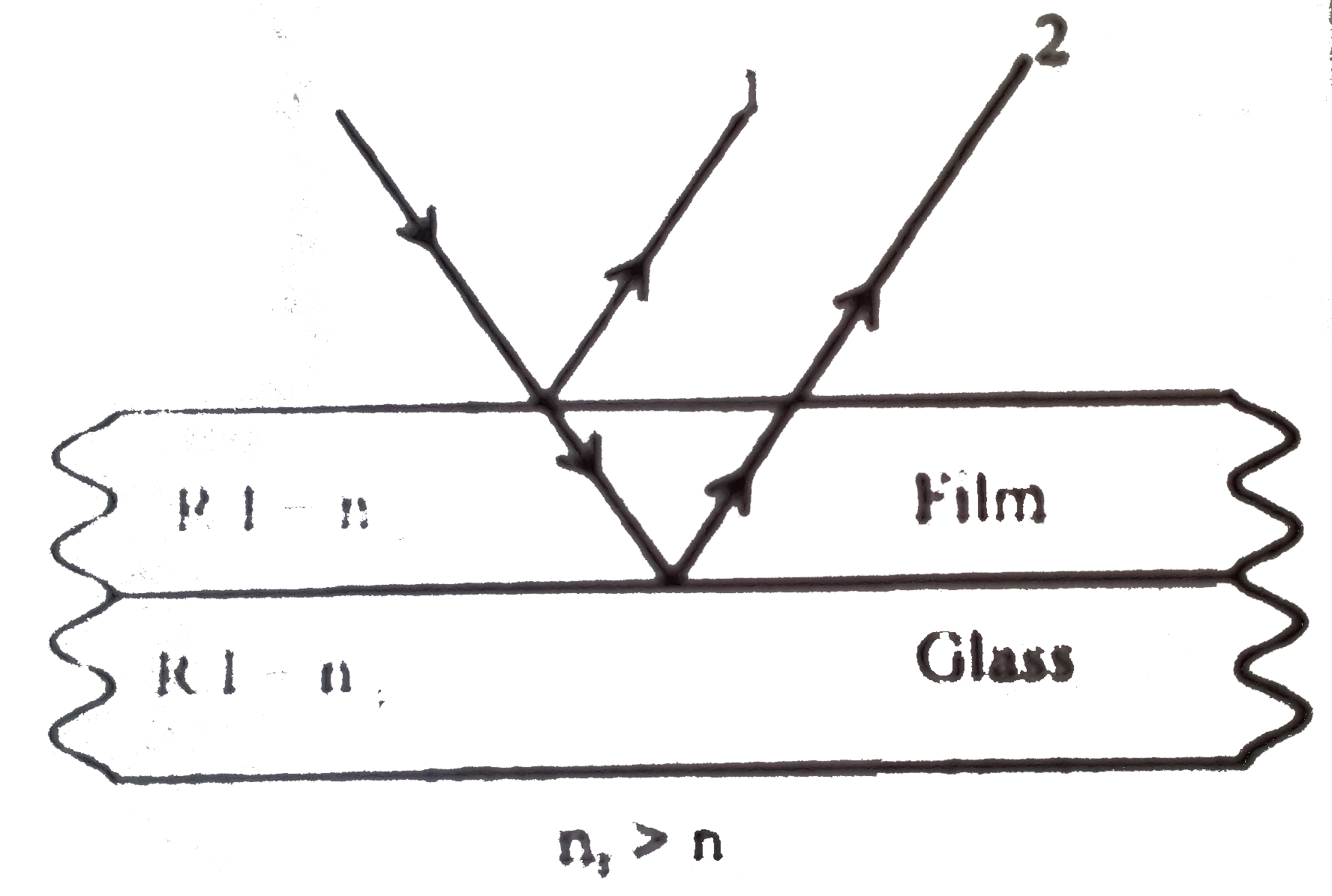A thin film of a specific meterial can be used to decrease the intensity of reflected light. There is destrucive inteference of wave reflected from upper and lower surface of the film. These films are called non-reflecting or anti-reflecting coatings. The process of coating the lens or surface with non-reflecting film is called blooming as shown in figure The refracting index of coating (n1) is less than that of the glass (n2).

6. If the thickness of film in above question in not technologically possible to manufacture, then next thickness of film required is (approximately)
300 nm
125 nm
750 nm
550 nm
The correct Answer is:a
2n1t=3λ2⇒t=3tmin≅300nm
Topper's Solved these Questions
- BOOK - CENGAGE PHYSICSCHAPTER - WAVE OPTICSEXERCISE - Integer3videos
WAVE OPTICS
- BOOK - CENGAGE PHYSICSCHAPTER - WAVE OPTICSEXERCISE - Archives4videos
WAVE OPTICS
- BOOK - CENGAGE PHYSICSCHAPTER - WAVE OPTICSEXERCISE - Assertion- Reasoning13videos
WAVE OPTICS
- BOOK - CENGAGE PHYSICSCHAPTER - THERMODYNAMICSEXERCISE - QUESTION BANK34videos
THERMODYNAMICS
- BOOK - CENGAGE PHYSICSCHAPTER - WAVESEXERCISE - QUESTION BANK38videos
WAVES
Similar Questions
A thin film of a specific meterial can be used to decrease the intensity of reflected light. There is destrucive inteference of wave reflected from upper and lower surface of the film. These films are called non-reflecting or anti-reflecting coatings. The process of coating the lens or surface with non-reflecting film is called blooming as shown in figure The refracting index of coating (n1) is less than that of the glass (n2).

4. If a light of wavelength λ is incident normally and the thickness of film is t, then optical path difference between waves reflected from upper and lower surface of the film isView SolutionA glass lens is coated on one side with a thin film of magnesium fluoride (MgF2)to reduce reflection from the lens surface (Fig. 2.26). The Index of refraction of MgF2 is 1.38, that of the glass is 1.50. What is the least coating thickness that eliminates (via interference) the reflections at the middle of the visible specturm (λ=550nm)? Assume that the light is approxmately perpendicular to the lens surface.
 View Solution
View Solution
Knowledge Check
- Question 1 - Select One
A thin film of a specific meterial can be used to decrease the intensity of reflected light. There is destrucive inteference of wave reflected from upper and lower surface of the film. These films are called non-reflecting or anti-reflecting coatings. The process of coating the lens or surface with non-reflecting film is called blooming as shown in figure The refracting index of coating (n1) is less than that of the glass (n2).

6. If the thickness of film in above question in not technologically possible to manufacture, then next thickness of film required is (approximately)A298.9 nm .B271.7 nmC304.7 nm .D550 nm, .’ - Question 2 - Select One
A thin film of specific material can be used to decrease the intensity of reflected light.There is destructive interference fo waves from uppe rand lower surface of the fil,m.These films are called non-reflecting coatings.The process of coating the lens of or surface with non-reflectig film is called bloomingas shown in fig.

Choose the correct statementsABoth 1 and 2 suffer change of π upon relfectionBOnlu 1 suffers a phase change of π upon reflectionCOnly2suffers a phase chagne of π upon reflection.DNeither 1 and2 suffer a phase change upon reflection. - Question 3 - Select One
A thin film of a specific meterial can be used to decrease the intensity of reflected light. There is destrucive inteference of wave reflected from upper and lower surface of the film. These films are called non-reflecting or anti-reflecting coatings. The process of coating the lens or surface with non-reflecting film is called blooming as shown in figure The refracting index of coating (n1) is less than that of the glass (n2).

5. magnesium fluoride (MgF2) is generally use as anti-reflection coating. If refractive index of MgF2 is 1.25, then minimum thickness of film required is (Take λ=500nm)A125 nmB75 nmC10 nmD225 nm
A thin film of specific material can be used to decrease the intensity of reflected light.There is destructive interference fo waves from uppe rand lower surface of the fil,m.These films are called non-reflecting coatings.The process of coating the lens of or surface with non-reflectig film is called bloomingas shown in fig.

Magnesium fluoride(MgF2) is genertally used as anti-reflectioncoating.If refrative index of MgF2 is 1.35 then minimum thickness of film required is (Takeλ=550nm)View SolutionWhen light is reflected from a surface it can be either regular reflection or diffuse reflection. The essential difference between regularly and diffusely reflecting surfaces is that
View SolutionStatement -1: If an exceedingly thin soap film is seen in reflected light, it may appear dark
Statement -2 : Three is a phase difference of π from the rays reflected from front and rear faces of the film.View SolutionThe angle of incidence at which reflected light is totally polarized for reflection from ait to glass (refractive index n), is :
View SolutionThe angle of incidence at which reflected light is totally polarised for reflection from air to glass (refractive index n) is
View Solution

